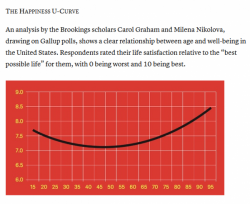Previously, I’ve been writing about mid career crises, and what researchers have termed the “Happiness U-Curve.” There’s a dip in life and career satisfaction at middle age, then an increase as we grow older.
Subsequent research revealed this age-related curve in job satisfaction is part of a much broader phenomenon. A similar midlife nadir is detectable in measures of people’s overall life satisfaction and has been found in more than 50 countries.
 The U-curve tells a more accurate tale of what happens midlife and mid career. It’s not a story of chaos or disruption, but of a difficult—yet natural—transition to a new equilibrium.
The U-curve tells a more accurate tale of what happens midlife and mid career. It’s not a story of chaos or disruption, but of a difficult—yet natural—transition to a new equilibrium.
Just knowing the phenomenon is common can be therapeutic. Princeton University health economist Hannes Schwandt cites a feedback effect: “Part of your disappointment is driven by the disappointment itself.”
Understanding the U-shaped curve allows us to recognize midlife as challenging, yet ultimately gratifying. We should resist judging ourselves harshly for feeling disappointed. We can avoid making bad decisions that potentially lead to midlife divorces and career catastrophes.
The Other Side of Midlife
Fortunately, most people avoid upending their lives at the first signs of midlife dissatisfaction. As noted earlier, only 25% of us even admit to experiencing a crisis. So, what happens to the75% who may feel dissatisfied at midlife, but who don’t do anything about it? Are they in denial or simply more mature?
Freud described two requisites for sanity: work and love. What happens when work and love lose their sparkle, as often occurs in midlife?
Work carries a large, invisible burden: the presumption that it will provide our lives with meaning and energize our spirits. Sometimes it does. By midlife, however, we may find that work drains us.
The ego tends to prefer security over development. Heeding it too closely means you may wind up with neither.
At midlife, most of us feel the need to rethink our priorities. Unfortunately, we avoid this task. It’s much easier to succumb to fear. We view change as threatening, and we don’t want to risk losing our hard-earned stability.
What about you? I I’d love to hear from you. I can be reached here or on LinkedIn.

Did You Enjoy This Article?
Join thousands of other smart business owners like yourself & get our Proffittable Times newsletter.
It's filled with actionable content you can apply immediately.
Sign up now to get started!
– Coach Nancy










